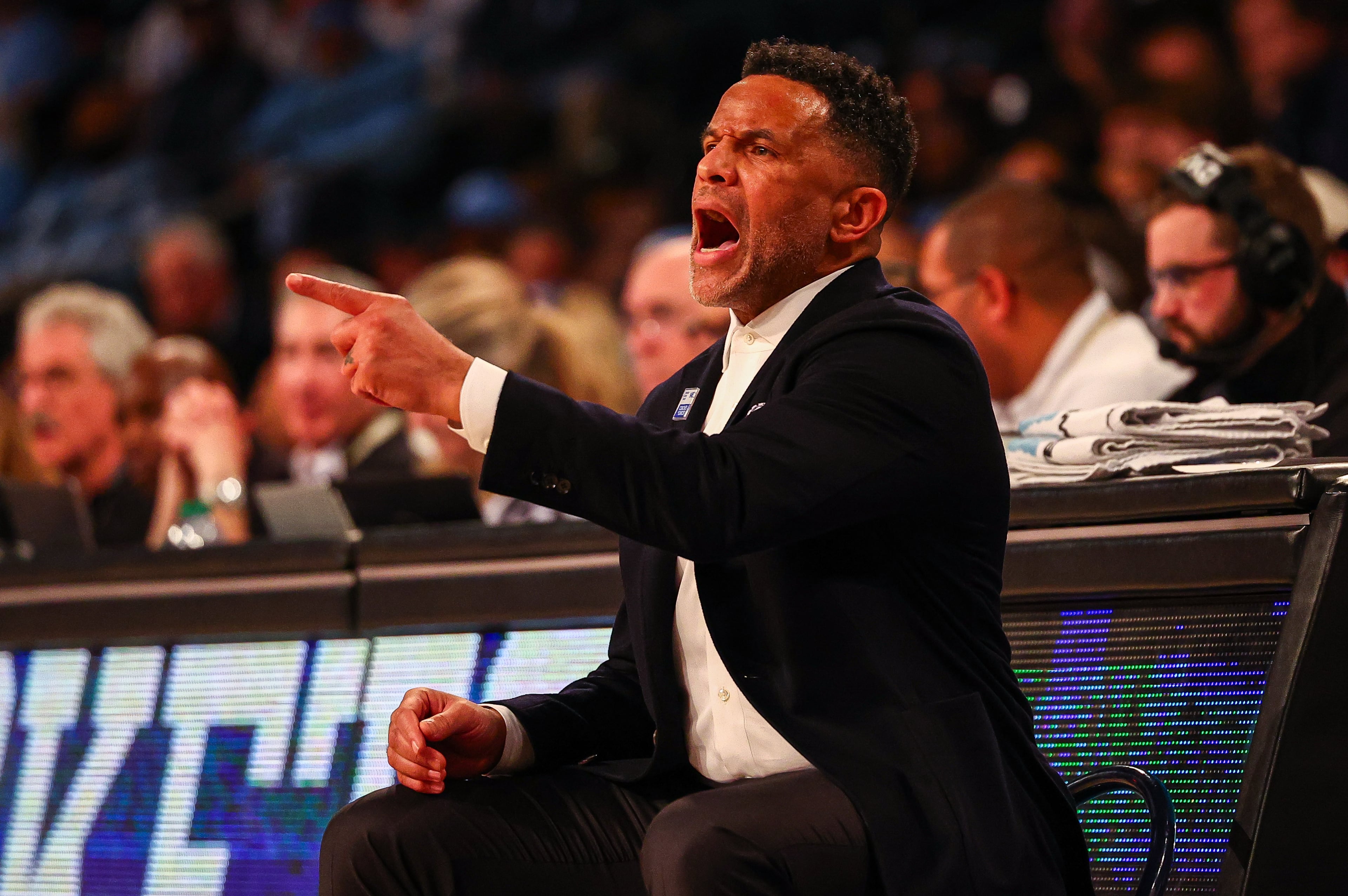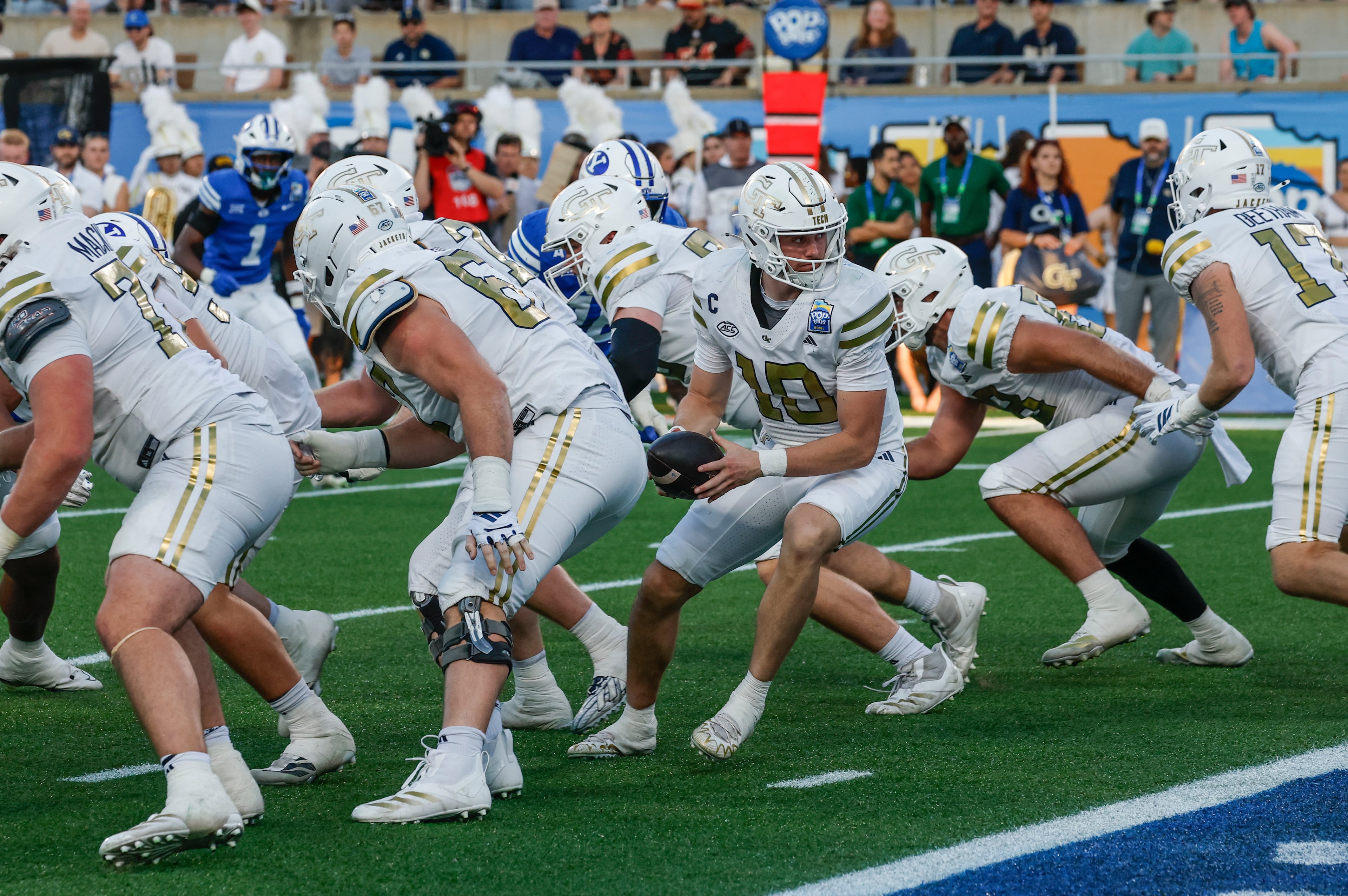Falling behind early and often, Georgia Tech needs first-half answers
After his team had finished taking care of Georgia Tech on Saturday, Boston College coach Jeff Hafley offered a compliment of the Yellow Jackets that wasn’t the sendoff they would have liked to hear from him as they traveled home from Chestnut Hill, Mass.
“They fought till the end,” Hafley said. “They had energy till the end. They never gave up.”
Hafley’s observation was predicated on a painfully familiar situation for the Jackets – having to try to fight back into games after falling into double-digit deficits.
Tech opponents have taken first-half leads of 10 points or more in all six of the Jackets' games thus far, significantly more the past two weeks. The slow starts have ushered them to defeat four times. Tech’s cumulative first-quarter and first-half scores are staggering – 72-21 and 168-62, respectively.
No. 4 Notre Dame, which visits Bobby Dodd Stadium on Saturday for the first time since 2006, surely requires no such head start.
“As a collective team – as a defense, as an offense, as a collective team – we have to start fast,” defensive coordinator Andrew Thacker said. “It is what we preach, and we have not done that in the two previous games, specifically, and over the course of the season. So we can’t wait to respond.”
Hafley’s Eagles were beneficiaries in their 48-27 win Saturday. In the game’s first 18 minutes, the Jackets fell behind 24-0 by submarining themselves with two turnovers (both in Tech territory, one scooped up and returned for a touchdown), two costly penalties (one that erased Jahmyr Gibbs' kickoff return for a touchdown) and defensive play that didn’t match the will of Boston College.
“I feel like we’re starting the game slow because we feel like we’re a team where we can just turn it on in the second half,” said running back Jordan Mason, whose second-quarter fumble in his first game back since the opener was returned 33 yards for an Eagles touchdown. “I feel like we need to just come out with more confidence, and we need to start way faster than what we’re doing.”
Offensive coordinator Dave Patenaude said that, before the Boston College game, he believed that the offense was ready to go, but the Jackets didn’t score until their fifth possession of the game, by which point the Eagles had put up 24 points.
He said he spoke with the offense Tuesday about “coming out of the gate and being ready to go and being in an attacking mode.”
For the offense, moving the ball hasn’t necessarily been the issue. Tech has averaged 5.3 yards per play and 5.9 for the first half, while the overall average is 5.7. Those numbers, particularly the first-half average, don’t suggest the drastic scoring imbalance.
Rather, turnovers have tripped up the Jackets. In six first quarters, they’ve turned the ball over six times – at least once in every opening quarter except for the Louisville game. The six giveaways have become 27 points for the opposition. In the first 15 minutes, Tech has turned the ball once every 17.3 offensive snaps.
For the remaining three quarters, the rate has been one turnover for each 26.2 snaps. It’s still not an average to aspire to – one turnover for every 60 offensive snaps is a very good rate – but at least it’s much better than in the first quarter.
On top of that, Tech’s giveaways often have given the opposition generous starting field position. Of the 72 points that have been scored on Tech in the first quarter, 34 of them – almost half – have been the product of drives started on the Jackets' side of the field.
The Jackets' defense has been riddled by big plays. Of the 39 scrimmage plays of 20 yards or more that the Jackets have given up on defense – most in the ACC – 26 of them have happened in the first half. In the first halves of the six games, Tech opponents have averaged 7.0 yards per play compared with 5.0 in the second.
It’s been a variety of reasons – poor tackling, not keeping focus on assignments, superior play by the opponents and more.
“We’ve just got to eliminate the explosives early in the game, eliminate the mishaps early in the game,” cornerback Tre Swilling said. “That just goes for everybody. Everybody has to come out of the game ready to play, honed in on our keys.”
The Syracuse game was an example of the disastrous impact that turnovers – and a defensive lapse – can have.
The teams traded punts, then Syracuse went up 7-0 when safety Juanyeh Thomas was unable to bring Orange running back Sean Tucker to the ground, and he ran for a 38-yard touchdown after Thomas' teammates eased up, thinking Tucker was tackled. On the second play of the next drive, on a second-and-4 at the Tech 31, quarterback Jeff Sims was hit as he threw, the ball popped in the air and was caught for an interception. Tech’s defense held, but Syracuse made a 47-yard field goal to make the lead 10-0.
On the next drive, the Jackets found their rhythm, overcoming a false start and converting two third downs to reach the Syracuse 18-yard line. But there, on a second-and-2, Sims was again hit in the pocket and again the ball went up in the air, where it was intercepted and returned to the Tech 37. The Orange reached the end zone for a 17-0 lead that the Jackets fought to reduce to three points in the third quarter but could not completely overcome in a 37-20 loss.
When the first quarter ended, the Orange was moving the ball better than Tech – 115 yards in 20 plays compared with 81 in 18 for Tech – but hardly an edge that would explain a 17-point advantage.
To Tech’s credit, the Jackets have continued the fight in the second half, where opponents hold a 79-75 scoring edge. Tech outgained Boston College 170-152 in the second half. Against Central Florida, after falling behind 28-7 in the first half, the Jackets drew to within 28-21 in the fourth quarter before giving way. They rallied from a 21-7 deficit to beat Louisville 46-27 in the team’s only turnover-free game of the season.
Notre Dame has done quite well in the first quarter on its way to a 5-0 record – the Fighting Irish have outscored the opposition 41-23 in the first quarter and 114-29 in the first half.
If Tech can’t find a way to start more effectively Saturday, Irish coach Brian Kelly may be the next to give the Jackets a pat on the back for not giving up.



